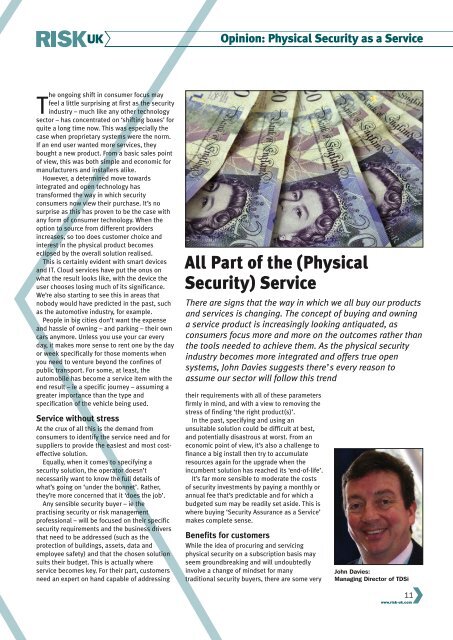RiskUKApril2017
Create successful ePaper yourself
Turn your PDF publications into a flip-book with our unique Google optimized e-Paper software.
Opinion: Physical Security as a Service<br />
The ongoing shift in consumer focus may<br />
feel a little surprising at first as the security<br />
industry – much like any other technology<br />
sector – has concentrated on ‘shifting boxes’ for<br />
quite a long time now. This was especially the<br />
case when proprietary systems were the norm.<br />
If an end user wanted more services, they<br />
bought a new product. From a basic sales point<br />
of view, this was both simple and economic for<br />
manufacturers and installers alike.<br />
However, a determined move towards<br />
integrated and open technology has<br />
transformed the way in which security<br />
consumers now view their purchase. It’s no<br />
surprise as this has proven to be the case with<br />
any form of consumer technology. When the<br />
option to source from different providers<br />
increases, so too does customer choice and<br />
interest in the physical product becomes<br />
eclipsed by the overall solution realised.<br />
This is certainly evident with smart devices<br />
and IT. Cloud services have put the onus on<br />
what the result looks like, with the device the<br />
user chooses losing much of its significance.<br />
We’re also starting to see this in areas that<br />
nobody would have predicted in the past, such<br />
as the automotive industry, for example.<br />
People in big cities don’t want the expense<br />
and hassle of owning – and parking – their own<br />
cars anymore. Unless you use your car every<br />
day, it makes more sense to rent one by the day<br />
or week specifically for those moments when<br />
you need to venture beyond the confines of<br />
public transport. For some, at least, the<br />
automobile has become a service item with the<br />
end result – ie a specific journey – assuming a<br />
greater importance than the type and<br />
specification of the vehicle being used.<br />
Service without stress<br />
At the crux of all this is the demand from<br />
consumers to identify the service need and for<br />
suppliers to provide the easiest and most costeffective<br />
solution.<br />
Equally, when it comes to specifying a<br />
security solution, the operator doesn’t<br />
necessarily want to know the full details of<br />
what’s going on ‘under the bonnet’. Rather,<br />
they’re more concerned that it ‘does the job’.<br />
Any sensible security buyer – ie the<br />
practising security or risk management<br />
professional – will be focused on their specific<br />
security requirements and the business drivers<br />
that need to be addressed (such as the<br />
protection of buildings, assets, data and<br />
employee safety) and that the chosen solution<br />
suits their budget. This is actually where<br />
service becomes key. For their part, customers<br />
need an expert on hand capable of addressing<br />
All Part of the (Physical<br />
Security) Service<br />
There are signs that the way in which we all buy our products<br />
and services is changing. The concept of buying and owning<br />
a service product is increasingly looking antiquated, as<br />
consumers focus more and more on the outcomes rather than<br />
the tools needed to achieve them. As the physical security<br />
industry becomes more integrated and offers true open<br />
systems, John Davies suggests there’s every reason to<br />
assume our sector will follow this trend<br />
their requirements with all of these parameters<br />
firmly in mind, and with a view to removing the<br />
stress of finding ‘the right product(s)’.<br />
In the past, specifying and using an<br />
unsuitable solution could be difficult at best,<br />
and potentially disastrous at worst. From an<br />
economic point of view, it’s also a challenge to<br />
finance a big install then try to accumulate<br />
resources again for the upgrade when the<br />
incumbent solution has reached its ‘end-of-life’.<br />
It’s far more sensible to moderate the costs<br />
of security investments by paying a monthly or<br />
annual fee that’s predictable and for which a<br />
budgeted sum may be readily set aside. This is<br />
where buying ‘Security Assurance as a Service’<br />
makes complete sense.<br />
Benefits for customers<br />
While the idea of procuring and servicing<br />
physical security on a subscription basis may<br />
seem groundbreaking and will undoubtedly<br />
involve a change of mindset for many<br />
traditional security buyers, there are some very<br />
John Davies:<br />
Managing Director of TDSi<br />
11<br />
www.risk-uk.com

















